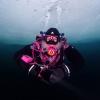
OW should be made more indepth/extensive
#1

Posted 09 February 2006 - 03:13 PM
Should advanced and open water be done as one class?
(since everyone breaks 100 feet in cozumel the next week anyhow.)
OK, everybody lets hear it.
#2

Posted 09 February 2006 - 03:27 PM
#3

Posted 09 February 2006 - 03:40 PM
Based on my personal OW experience with PADI, I'd definitely say yes; but according to what I need to do in order to pass YMCA's OW, I'd say it's just fine as it is.
As for combining OW and AOW, I'll let those who've actually completed both comment.
#4

Posted 09 February 2006 - 05:21 PM
#5

Posted 09 February 2006 - 08:17 PM
I feel that OW is just a license to learn. It is not a card saying you know it all. A basic knowledge of skills - enough to get out there and not kill themselves or the marine life - now it is up to the diver to really learn how to dive.
If you make the classes longer by combining the two classes - they will be harder to access and have to cost more money. This will make it harder for people to take -- thusly less people will take them. Less classes = less gear sales. This will in turn put more shops out of business.
I think more shop supported type of club diving after a diver gets out of OW would be helpful (especially for that more timid diver) to build more skills and confidence. Then continue to offer advanced certification as is already done.
Pink ~~~ It's the New Black!!!
#6

Posted 09 February 2006 - 10:12 PM
However, should you decide to take the training, I think it should be the real thing and not a watered down process where the diver essentially receives ten cards just to cover what should be covered in one comprehensive, basic course covering the minimums. While you can't do it all in the initial training, there is a certain minimum that should be required. In my humble opinion, the current minimum falls way short of what I would require for the entry level certification of divers if I were to rule the world.
There should be a prerequisite showing of adequate swim skills before one should be permitted to engage in scuba training. This does not mean professional swim skills; it only means being capable of swimming on the surface, underwater, and being able to do a basic survival float: just the basics. If the student doesn't have this going into the course, the student should be referred to a swim instructor until ready to proceed.
Passing the swim evaluation, the student would proceed to a single course comprised of what is currently taught separately as Skin (free) Diver, Scuba Diver, Advanced Diver and Rescue Diver. In addition, this course would include the equivalent of DAN training. It would either include, or would require the student to show proof of, CPR and first aid training prior to receiving the initial certification card.
Once a student would complete this level of training, that would be the first time that I would say that the student is ready to receive a license to learn, otherwise known as entry level certification. Out of all this training, one card with nothing before then.
I am not talking about going back to doing pushups with tanks on your back. However, I am talking about the minimum training to carry out basic diving and to resolve safety issues that come up while engaging in the basics. This might seem pretty drastic for some. However, what I have outlined here is what I would consider the minimum.
"For the diligent diver, closed circuit rebreathers are actually safer than open circuit scuba." Tom Mount
#7

Posted 09 February 2006 - 10:51 PM
I dunno -- sometimes I am kinda torn on this.
I feel that OW is just a license to learn. It is not a card saying you know it all. A basic knowledge of skills - enough to get out there and not kill themselves or the marine life - now it is up to the diver to really learn how to dive.
Kimber- how many divers coming straight out of BOW do you really feel have enough dive experience to dive safely? I've seen relatively few.
When I took LAC OW, I believe it was a 2-3 week course with a number of classroom and poll sessions as well as boat and beach dives. It was the 60's so my memory is "perfect" for someone who was actually there. Even though I was a competitive swimmer and had already been diving sporadically in shallow fresh water for 7 years before I actually got certified, I'm not sure I was really ready for ocean diving. It took about 10-15 dives before I felt comfortable here in Catalina waters.
Edited by drbill, 09 February 2006 - 10:52 PM.
#8

Posted 09 February 2006 - 11:18 PM
I dunno -- sometimes I am kinda torn on this.
I feel that OW is just a license to learn. It is not a card saying you know it all. A basic knowledge of skills - enough to get out there and not kill themselves or the marine life - now it is up to the diver to really learn how to dive.
Kimber- how many divers coming straight out of BOW do you really feel have enough dive experience to dive safely? I've seen relatively few.
When I took LAC OW, I believe it was a 2-3 week course with a number of classroom and poll sessions as well as boat and beach dives. It was the 60's so my memory is "perfect" for someone who was actually there. Even though I was a competitive swimmer and had already been diving sporadically in shallow fresh water for 7 years before I actually got certified, I'm not sure I was really ready for ocean diving. It took about 10-15 dives before I felt comfortable here in Catalina waters.
I am sorry -- but this is not brain surgery here. It is recreational scuba diving. You put the lookie through thing on your face. The swimmy things on your feet and the breathy thing in your mouth and you go for a swim. With computers these days it makes it all pretty fool proof.
There are people out there who will get certified and go to tropical places and dive once every several years and ya know what -- they live. This is not the exception. Most divers are oblivious to the potential safety hazards. The divers like you are I and others here are in the minority. It is the infrequent vacation diver who makes up the majority of divers in the world and they are the ones who are rarely getting hurt or dying. This is reallly the sad truth.
Pink ~~~ It's the New Black!!!
#9

Posted 10 February 2006 - 12:24 AM
First off, as I have stated previously, if you want to put on a set of gear, jump off a boat, and kill yourself because you don't want to bother getting training, I am all for it if that is what you want to do so long as you don't take me along with you. I start with the premise that certification should be a completely voluntary process.
However, should you decide to take the training, I think it should be the real thing and not a watered down process where the diver essentially receives ten cards just to cover what should be covered in one comprehensive, basic course covering the minimums. While you can't do it all in the initial training, there is a certain minimum that should be required. In my humble opinion, the current minimum falls way short of what I would require for the entry level certification of divers if I were to rule the world.
There should be a prerequisite showing of adequate swim skills before one should be permitted to engage in scuba training. This does not mean professional swim skills; it only means being capable of swimming on the surface, underwater, and being able to do a basic survival float: just the basics. If the student doesn't have this going into the course, the student should be referred to a swim instructor until ready to proceed.
Passing the swim evaluation, the student would proceed to a single course comprised of what is currently taught separately as Skin (free) Diver, Scuba Diver, Advanced Diver and Rescue Diver. In addition, this course would include the equivalent of DAN training. It would either include, or would require the student to show proof of, CPR and first aid training prior to receiving the initial certification card.
Once a student would complete this level of training, that would be the first time that I would say that the student is ready to receive a license to learn, otherwise known as entry level certification. Out of all this training, one card with nothing before then.
I am not talking about going back to doing pushups with tanks on your back. However, I am talking about the minimum training to carry out basic diving and to resolve safety issues that come up while engaging in the basics. This might seem pretty drastic for some. However, what I have outlined here is what I would consider the minimum.
I understand what you are saying here -- but I don't necessarily agree. I think for a diver to be able to posess the ability to be a profeceint rescue diver they have to have some experience in the water. Unless your ideal class is pretty long and has a lot of diving going on between the OW portion - AOW portion -- Rescue portion -- I think it would be popping out divers who don't have the solid experience to back up their training.
In theory I like it -- but in execution I am not so sure...
Pink ~~~ It's the New Black!!!
#10

Posted 10 February 2006 - 08:07 AM
The more inclusive that diving is, the greater its future will be! An aside of this is that the increase in the number of folks that are exposed to the underwater world will result in greater appreciations for the preservation and ecological concerns of our environment.
Capt. Nemo...........20,000 Leagues under the Sea
#11

Posted 10 February 2006 - 11:27 AM
I'd like to see something like that, but maybe I'm just looking for work. The characterization of the once-a-year vacation diver fits most of the clients in my LDS. The ironic part is the ones who want to do a pool review, and dive on vacation with operators who have in-water DMs are the better divers! The scary ones are the folks in breeze in, drop 10 large on dive gear for their family, push through an OW cert, then go off to dive in some exotic, 3rd world locale!
Edited by Capn Jack, 10 February 2006 - 11:34 AM.
Jacques Yves Cousteau
#12

Posted 10 February 2006 - 12:37 PM
That's the way it used to be when I was certified for anything within recreational limits back in the 60's. IN DEPTH instruction is really needed these days (as it was then) to ensure newly certified divers are truly prepared.
I agree. Now a days I have seen people come into the "Advanced" class with whom I gaze at with amazement. These are truely amazing people, they have survived on their own long enough to make it to the next class. This only comes from coddling students through the system and with spoon fed answers. I think that they would appreciate the class more if more were expected of them.
#13

Posted 10 February 2006 - 01:12 PM
#14

Posted 10 February 2006 - 06:54 PM
By all that is wet, I do hereby swear, (politely), and attest, upon pain of never diving again, (real or imagined), that I understand and affirm, that I agree to the above.
_________________________________________(log in name signature)
Signed and Dated
#15

Posted 10 February 2006 - 07:41 PM
0 user(s) are reading this topic
0 members, 0 guests, 0 anonymous users




















